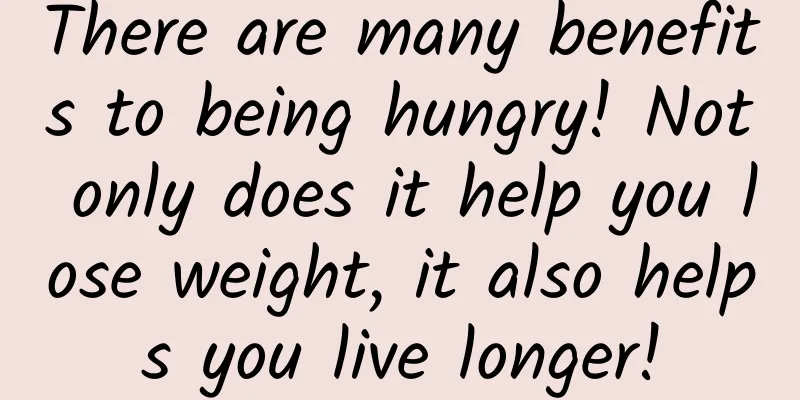There are many benefits to being hungry! Not only does it help you lose weight, it also helps you live longer!

|
"Don't let yourself go hungry!" This is a favorite saying of our elders. When it comes to going hungry, most people's first reaction is: Will it be bad for the body? ! Hunger is even synonymous with pain. Many people have only experienced it when they are losing weight. However, scientific research has found that for modern people who have no worries about food and clothing, starving yourself is not only a way to lose weight, it is even an important secret to longevity, and it has more than just a few benefits to the body. Eat only 70% to 80% full every day 2 years later, they are in better health Scientists have actually been studying hunger and human health for many years and have received good feedback in real life. The most famous study is a long-term follow-up project called CALERIE: researchers conducted a two-year calorie diet restriction and physical and psychological monitoring on 218 participants. This group of people had to maintain a daily diet of only 75% of the energy needed by the body for two years, that is, to maintain a state of 70% to 80% full. As a result, they: lost weight, had better blood sugar levels, improved blood lipids, lowered blood pressure, stabilized hormone levels, and had more stable moods. Copyright images in the gallery. Reprinting and using them may lead to copyright disputes. A study published in the latest top journal Science even found that hunger can prolong life. Moreover, you don’t need to be really hungry, just being mentally hungry can help you live longer. Scientists have made this amazing discovery in fruit flies: the lifespan of the group of fruit flies that feel hungry is much longer than that of the normal group. With the same survival rate (75%), the lifespan of the hungry group is about 1.5 times that of the normal group . There is no clear research on how much impact it can have on human life span, but it is at least a good expectation. As for why starvation has such a big impact on humans and animals, the scientific community has made some new discoveries. Hungry Give your body time to clear out the waste If you eat too much, you will feel sleepy. If you are hungry, you will feel more energetic! There is a reason for this feeling in life. A study on intermittent hunger found that if you occasionally starve, your body will have less waste. The researchers recruited 39 patients with metabolic syndrome and divided them into two groups: One group adopted intermittent fasting: strictly restricting energy intake by about 70% for 2 days a week, and eating as they please for the other 5 days. In simple terms, there are 2 days a week when you eat until you are 70% full at each meal; The other group had normal eating habits. After 8 weeks, scientists found interesting changes in the intestinal environment of the intermittent starvation group: the level of endotoxin (lipopolysaccharide) in the body decreased. Lipopolysaccharide is a common endotoxin derived from bacteria in the intestines. Elevated concentrations can cause a strong inflammatory response. Image source: Literature At the same time, it was observed that the number of beneficial bacteria in the intestines increased significantly. Scientists speculate that in the current environment, when we eat a lot and eat too much, our bodies are always in an overly busy process. Imagine your current life, from waking up to going to bed, you are constantly eating: breakfast at 9 o'clock, lunch at 12 o'clock, afternoon tea at 3 o'clock, dinner at 6 o'clock, supper at 9 o'clock... Your mouth is off work, but your body has to get off work overtime! Appropriate hunger will prevent the body from having to bear too much energy metabolism, and will have surplus energy to promote the growth of healthy bacteria, create a healthier intestinal environment, and make our intestines more powerful to clear out waste . Some mouse experiments have even found that hunger can also activate the "cell cleaning system" called autophagy in the liver, fat, brain and muscles, accelerating the removal of "dirty things" such as harmful substances and damaged cells in the body. On the contrary, if you eat too much, it will be difficult for the cleaning system to fully wake up, allowing more harmful substances to accumulate in the body. In a sense, hunger is like a pause signal, telling the body "Hey, now is the time to do some spring cleaning." Hungry Let the body's metabolism follow the rhythm of the biological clock For many office workers, not only do they eat too much, but they also eat later and later. Our daily routine has changed from the days when the whole family would sit together to eat dinner before dark to now when we eat breakfast at 12 o'clock and dinner at 10 o'clock. This eating habit has disrupted our internal biological rhythm formed over tens of thousands of years, making it more difficult for our bodies to process excess energy. Copyright images in the gallery. Reprinting and using them may lead to copyright disputes. A study published in Nature Communications recruited volunteers to experience the effects of being hungry for different periods of time on the body. The scientists recruited 82 volunteers and divided them into three groups: One group was starved at night, that is, they could eat as much as they wanted between 6 a.m. and 3 p.m., but were starved the rest of the time; One group was starved in the morning, that is, they could eat as much as they wanted between 11 a.m. and 8 p.m., and they were starved the rest of the time; The last group is the control group, which allows people to eat whatever they want, which means they can eat as much as they want all day long. This starvation pattern lasted for 5 weeks, and after 5 weeks it was found that compared with people who ate whenever they wanted, fasting blood sugar levels had improved significantly regardless of whether they were hungry in the morning or at night. At the same time, the weight and body fat percentage of the starving group also decreased, which may be related to the reduction in energy intake. After all, the total energy intake is reduced unconsciously due to the reduced time for eating. However, only the group that starved at night had a significant decrease in insulin resistance. Changes in different groups before and after 5 weeks of intervention Scientists analyzed that due to long-term biological evolution, the body has a greater demand for food during the day and a faster metabolism. At night, the body gradually returns to the metabolic state during sleep, with a smaller demand for energy and a slower metabolism. Some studies have found that if the same amount of calories is eaten during the day or at night, the body metabolizes fat much less at night and it is more likely to be stored by the body. Think about it, when you go to bed with a full stomach, our body still needs to spend energy processing food instead of being in a better rest and repair mode. Remember to give your body some rest time In modern society, food is so abundant and there are so many temptations that humans are no longer satisfied with just "eating enough". Due to excessive energy intake and insufficient energy consumption, many health problems of modern people are really caused by "overeating". Obesity is just a signal given by the body - it is already overwhelmed. In addition to delicious food, our lives are also oversaturated: There are endless short videos and picture messages, and you will never lack "instant happiness" as long as you are online; Telephones, chat software, and millisecond-delivered social relationships have brought people too close together; The pace of life is as fast as light. Children, houses, cars, money, there is always an invisible hand pushing us forward. Our lives are the same, we can't be too full. It's good to be hungry and take a break. Friendly reminder: Starving yourself is not a diet, just eat until you are 70% to 80% full. It is also not suitable for children, people who are prone to hypoglycemia, people with gastrointestinal diseases and other special diseases. It is recommended to do it under the guidance of professionals. For most people: Don’t eat too much and don’t eat too late, it’s good for your health. References [1] KJ Weaver et al. ,Effects of hunger on neuronal histone modifications slow aging in Drosophila.Science380,625-632(2023).DOI:10.1126/science.ade1662 [2] Xie Z, Sun Y, Ye Y, Hu D, Zhang H, He Z, Zhao H, Yang H, Mao Y. Randomized controlled trial for time-restricted eating in healthy volunteers without obesity. Nat Commun. 2022 Feb 22;13(1):1003. doi: 10.1038/s41467-022-28662-5. PMID: 35194047. [3] Guo Y, Luo S, Ye Y, Yin S, Fan J, Xia M. Intermittent Fasting Improves Cardiometabolic Risk Factors and Alters Gut Microbiota in Metabolic Syndrome Patients. J Clin Endocrinol Metab. 2021 Jan 1;106(1):64-79. doi: 10.1210/clinem/dgaa644. PMID: 33017844. [4] Tang D, Tang Q, Huang W, Zhang Y, Tian Y, Fu PMC10037992. [5] WHO Expert Consultation. Appropriate body-mass index for Asian populations and its implications for policy and intervention strategies. Lancet. 2004 Jan 10;363(9403):157-63. doi: 10.1016/S0140-6736(03)15268-3. Erratum in: Lancet. 2004 Mar 13;363(9412):902. PMID: 14726171. [6] Dorling JL, van Vliet S, Huffman KM, Kraus WE, Bhapkar M, Pieper CF, Stewart T, Das SK, Racette SB, Roberts SB, Ravussin E, Redman LM, Martin CK; CALERIE Study Group. Effects of caloric restriction on human physiological, psychological, and behavioral outcomes: highlights from CALERIE phase 2. Nutr Rev. 2021 Jan 1;79(1):98-113. doi: 10.1093/nutrit/nuaa085. PMID: 32940695; PMCID: PMC7727025. [7] Martinez-Lopez N, Tarabra E, Toledo M, Garcia-Macia M, Sahu S, Coletto L, Batista-Gonzalez A, Barzilai N, Pessin JE, Schwartz GJ, Kersten S, Singh R. System-wide Benefits of Intermeal Fasting by Autophagy. Cell Metab. 2017 Dec 5;26(6):856-871.e5. doi: 10.1016/j.cmet.2017.09.020. Epub 2017 Oct 26. PMID: 29107505; PMCID: PMC5718973. Planning and production Source: Suiqian's Nutrition Hut Author: Liu Suiqian, certified by the Australian Nutritionists Association, clinical practicing nutritionist Editor: Yinuo |
Recommend
SEO article standards, what are the requirements and specifications for SEO article writing?
Many companies have many requirements for recruit...
China Automotive Power Battery Industry Innovation Alliance: Ranking of domestic power battery manufacturers in January 2022
Recently, the China Automotive Power Battery Indu...
As soon as summer comes, the "little bumps" that grow on the back, what are they?
alert! alert! alert! ...... ...... Source: Dr. Cu...
Explore exciting entertainment, Huawei VR Glass glasses bring you real fun experience!
As people's lifestyles change, more and more ...
4 common misunderstandings about information flow creativity, skip the conversion and double it immediately!
We all know what the role of creativity is - to a...
Xiaohongshu’s corporate promotion strategy!
Recently, especially in the past one or two years...
A rough man enjoys exercising and losing weight
A brief introduction to Yijieren Yuelian Yueshou ...
Basic knowledge of POS machines, understand POS machine knowledge
The POS machine used always jumps code, which caus...
Excellent case study sharing: How was the cost of information flow advertising reduced by 75%?
With the implementation of the housing purchase r...
Tianzhou-5 docked successfully! Setting a new record for China's space program!
Image source: Xinhua News Agency reporter Yang Gu...
The third session of the Aiti Tribe Technical Clinic
【51CTO.com original article】 [51CTO original arti...
Classic "Event Marketing" Cases You Must Know When Operating an App
Topic marketing and event marketing are unfathoma...
Pilots are not allowed to have scars, but why can injured pilots continue to fly?
As we all know, the medical examination for pilot...









